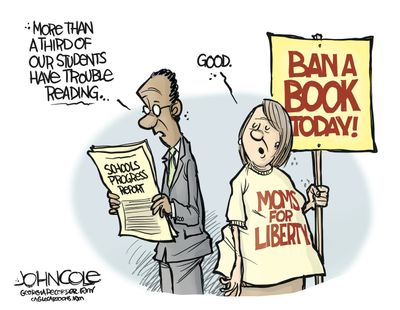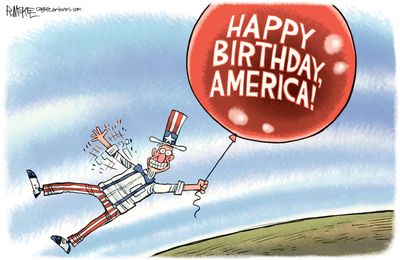This story was originally published by The Trace, a nonprofit newsroom covering gun violence in America. Sign up for its newsletters here.
For the first time in nearly three decades, the U.S. Senate and House of Representatives passed gun reform legislation. President Joe Biden signed it into law on June 25.
The Bipartisan Safer Communities Act includes billions in funding for mental health services, state red flag laws and crisis intervention programs, community violence prevention, and school safety — as well as several provisions that relate more directly to firearms and who can purchase them.
Those provisions include an effort to keep guns out of the hands of people who abuse their dating partners by closing the so-called boyfriend loophole, clarifying who needs to seek a Federal Firearms License — which is likely to subject many more gun purchases to background checks — and enhancing background checks on gun purchasers under 21.
Many questions remain about what effect the law will have. Experts say it will depend largely on how the policies are implemented by federal law enforcement agencies like the Bureau of Alcohol, Tobacco, Firearms and Explosives, which regulates the firearms industry, and the FBI, which operates the background checks system — and whether state and local law enforcement agencies cooperate with the new regulations.
“This federal legislation is a starting point, because it is channeling resources, it is putting other things in play, and gun policy occurs after a piece of legislation is signed,” said Daniel Webster, a professor and expert on gun policy at Johns Hopkins University’s Bloomberg School of Public Health.
While any legislative action on a long-dormant issue is significant, the bill is not nearly as expansive as many progressives had hoped for. It does not mandate universal background checks, nor does it ban assault weapons or high-capacity magazines. And to overcome the Senate’s 60-vote filibuster rule, Democrats made significant concessions.
Here’s our accounting of exactly what’s in the law, with a breakdown of which changes are clear, and which will be determined by implementation:
The boyfriend loophole
Since 1996, people with misdemeanor domestic violence convictions have been barred from getting and possessing firearms if their victim is a spouse, cohabitating partner, child, co-parent, or close family member. The federal prohibition also applies to those subject to domestic violence restraining orders.
The new law will extend that prohibition to people with misdemeanor domestic violence convictions in which their victim was a dating partner.
Technically speaking, the legislation updates the definition of “intimate partner” to include those in dating relationships. The bill defines dating relationships as “a relationship between individuals who have or have recently had a continuing serious relationship of a romantic or intimate nature.”
Beyond that, the law leaves the determination up to the courts, which will have to consider the length of the relationship, the nature of the relationship, and the frequency and type of interaction between the people involved in the relationship. It excludes acquaintances in business or social contexts.
This is not the first time the Senate has attempted to close this gap. Earlier this year, Democrats tried to get a similar provision in the reauthorization of the Violence Against Women Act.
This time, Democrats made significant concessions to Republicans: A person convicted of domestic violence in a dating relationship will have their gun rights restored after five years. That limit only applies if the person doesn’t have more than one conviction and doesn’t commit another offense in those five years.
The measure also won’t be retroactive, meaning that it only includes convictions that occur after the law goes into effect. It also doesn’t cover people who are subject to domestic violence restraining orders, which is a protection given to other domestic violence victims in more traditional relationships. The law, Webster said, leaves “dating partner victims vulnerable to armed and violent partners.”
Nevertheless, the change could have a significant impact on gun violence. Firearms are used in more than half of all intimate partner and domestic homicides. And approximately half of intimate partner homicides in the U.S. are committed by dating partners. There is also a nexus between mass shootings and domestic violence, with some research suggesting that measures to decrease firearms access for perpetrators of domestic violence may also prevent mass shootings.
States that have already taken steps to close the dating partner loophole have seen declines in intimate partner homicides, but notably, that reduction was associated with laws that cover those subject to domestic violence restraining orders.
Federal Firearms Licenses
The new law does not require background checks on all firearms sales, but it does include a provision that could ultimately subject more gun sales to checks.
Federal law requires licensed gun dealers, known as Federal Firearms Licensees, to initiate a background check on all prospective gun purchasers. If a person buys a gun from an unlicensed seller, however, federal law doesn’t require a background check or a record of the transaction. Though 21 states have passed laws requiring unlicensed sellers to initiate background checks, 29 states do not have laws that require background checks on private sales.
Sellers who are “engaged in the business of dealing in firearms” must seek a Federal Firearms License (FFL). But until the passage of the new law, the definition for that phrase was ambiguous. It was intended to exempt private sales — like those between family and friends — but many sellers use that same gap to avoid registering as an FFL while still routinely selling guns at gun shows or through online classified sites. This is typically known as the “gun show loophole,” even though many licensed dealers sell at gun shows and are required to conduct checks whether they’re in a store or at a gun show.
A measure in the Safer Communities Act aims to clarify which sellers need to get an FFL by altering the definition of “engaged in the business.” The new definition includes anyone selling guns with the main intent of making a profit.
The previous definition directed those who sold guns “with the principal objective of livelihood and profit” to get a license. But proving that someone was selling guns to support their livelihood in addition to making a profit was more difficult than just showing that they aimed to make a profit.
“Livelihood and profit was always a difficult hurdle [for ATF agents and prosecutors],” David Chipman, a former ATF special agent, told The Trace. “[The seller] would say, ‘I have this job, and maybe I made $10,000 from selling guns, but I made $50,000 from my job.’”
The Obama administration attempted to make a similar clarification in 2016 via executive order, but it largely failed because it did not have the force of law, Chipman said. Though it directed the ATF to crack down on such sellers evading licensing, it left prosecutors — already reluctant to enforce the provision — with the definition that existed in the statute. This time, Chipman said, could be different.
Still, it’s hard to tell how many more gun sales could be subject to background checks, and it’s difficult to know how many people are selling guns without licenses. “It’s very difficult just to monitor firearm sales from licensed dealers, but monitoring sales from people who are unlicensed — we don’t have a lot to go on,” Webster said.
Thirteen percent of new gun owners who purchased their firearms said in a 2017 survey that they had done so without a background check. The same survey found that 45 percent of gun owners who bought a gun online in the previous two years did not undergo a background check. A separate study found that roughly 80 percent of guns acquired for criminal purposes are obtained through unlicensed sellers.
“I’m a little bit bullish on the impact of this because it not only affects a lot of people who are selling a lot of guns, but it’s the volume of guns that they’re selling,” Webster said.
Chipman and Webster agree that, if fully enforced, the new provision could lead to fewer guns being diverted into underground markets.
“It’s more than just having a license,” Chipman said. “It’s the requirement that if you’re going to do this, you have to issue background checks, and you have to create paperwork.”
This small but significant change won’t fix everything, though. Unscrupulous FFLs, though licensed, have been known to sell to straw purchasers, transfer guns without background checks, and doctor sales records — and the ATF let them off the hook.
Enhanced background checks for those under 21
The new law aims to strengthen background checks for gun buyers under age 21 by searching for past juvenile convictions that would block them from getting a gun. When a young adult tries to buy a gun, the FBI’s National Instant Criminal Background Check System must now contact the juvenile justice system or a criminal records authority in the buyer’s home state to determine if the person has a disqualifying juvenile record. Those records will include any juvenile felony conviction, misdemeanor domestic violence conviction, or an involuntary commitment to a mental health institution after the person turned 16.
The new law also requires NICS to contact the state custodian of mental health records and the buyer’s local law enforcement agency to search for those disqualifying records. Under previous federal law, a sale could proceed after three days even if a determination on a background check has not been made. This is frequently referred to as the “Charleston Loophole” because the mass shooter who targeted Mother Emanuel AME Church in Charleston, South Carolina, in 2015 received his gun despite his check not being completed.
The new law takes a small step toward closing that gap, at least for those under 21, by giving authorities more time to conduct the enhanced check. Now, if NICS finds cause to extend the investigation into a person under 21 and notifies the dealer within three days, it can extend the investigation for up to 10 days. But after that point, the sale can still proceed even if NICS hasn’t finished its investigation.
But state authorities and local law enforcement agencies aren’t required to participate in this system; in fact, Congress can’t force states to provide any records to NICS, nor can it compel states to participate. Participation in both NICS and now these enhanced checks is entirely voluntary for states.
On top of that, record-keeping practices for juvenile criminal and mental health vary by state and even by county. In at least 15 states, juvenile records are automatically sealed or expunged in certain circumstances. Not all juvenile offenses will prohibit someone from purchasing a gun because federal law defers to the states to define what constitutes a conviction. Some do not classify certain juvenile adjudications as criminal convictions, even if the offense would be considered a felony had the person been tried as an adult.
The enhanced background check provisions would expire after 10 years.




